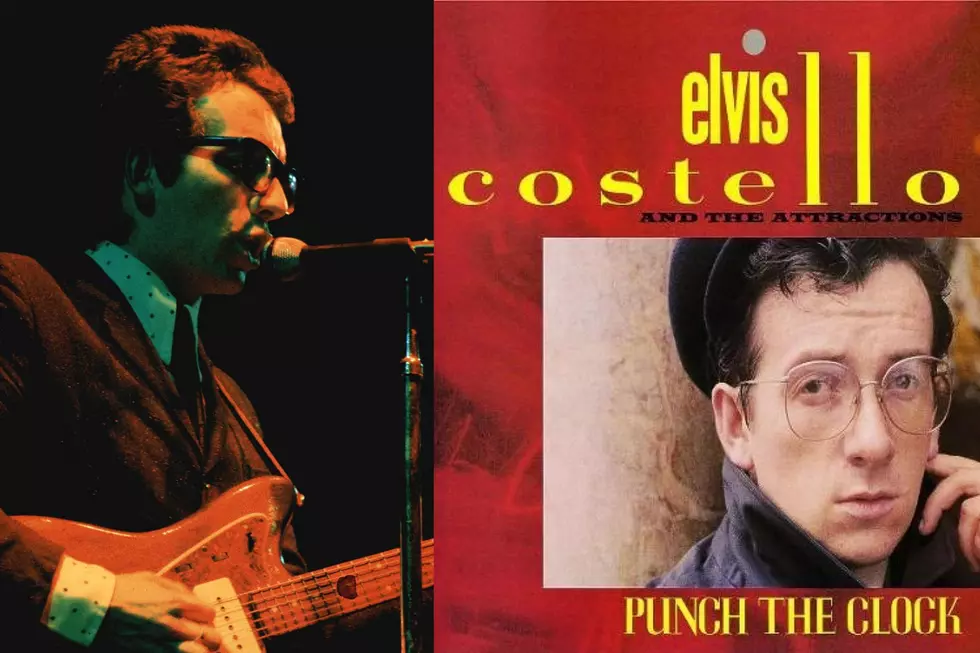
Why Elvis Costello Was Not Happy With ‘Punch the Clock’
By 1983, Elvis Costello had experienced both ends of the career spectrum.
He enjoyed commercial success with his first albums, but had trouble landing hit singles from 1981's Almost Blue and 1982's Imperial Bedroom. So Costello figured it was time to turn his attention back toward a more pop-based radio-friendly sound for Punch the Clock.
"Counting [1981's] Trust, we'd gone three records without any substantial hit apart from 'Good Year for the Roses,'" he said in 2013's Complicated Shadows: The Life and Music of Elvis Costello. "You have to consider if you allow that contact with the mainstream audience to be served for too long, you may lose the freedom to do what you want to do."
Working with his Attractions and producers Clive Langer and Alan Winstanley, Costello focused on writing songs that were easier to latch on to and more rhythmic. He also recorded them in a more structured manner. "Being in a fairly feckless frame of mind, I had dashed off a couple of bright pop tunes that didn't have much else to them," Costello said in the liner notes for a 2003 reissue of Punch the Clock.
Released on Aug. 5, 1983, the album was dotted with more upbeat numbers like "The Greatest Thing," "Let Them All Talk" and "The Element Within Her" that offered themes of hope, requited love and beauty that frankly were quite different from Costello's usually more cynical subjects.
"I think he accepted that that's what we did as producer: hits," Langer said in Complicated Shadows. "He always reacts against what he's done before, so we went for it. We tried to get singles."
Watch Elvis Costello's 'Everyday I Write the Book' Video
Things moved along at a very fast pace in the studio. Costello's cheerful sounding "Everyday I Write the Book" became the best known song from Punch the Clock, and it was written in about 10 minutes.
"I thought maybe I could write just a simple, almost formula song and make it mean something," Costello told interviewer Simon Grigg in 1998. "I was quite happy with it." The addition of "a kind of Merseybeat knock-off" arrangement completed things.
Even so, Costello "remained allergic to the happy ending" so he still included some songs that felt more in line with his traditionally flinty mindset. In "Mouth Almighty," he sings: "I threw away the rose and held onto the thorn." "King of Thieves" features a classic Costello put down: "If I were you, I'd change my name again." Then there was "Shipbuilding," which noted with sad irony that England's docks were only thriving again because of the early-'80s Falklands War. Costello would later describe this track as "less of a protest song than a warning sign."
Other new faces also subtly shifted their approach. Punch the Clock featured the TKO horns, including Jim Paterson on trombone, Jeff Blythe on alto saxophone and Paul Speare on tenor sax. Backing vocals were provided by Caron Wheeler and Claudia Fontaine, known as Afrodiziak. The brightest guest star of all was Chet Baker, who added a trumpet solo on "Shipbuilding."
Listen to Elvis Costello's 'Shipbuilding'
The jazz great had been playing a local residency, and Costello went by to introduce himself between sets. "There is no false modesty in saying that he had no idea who I was. Why the hell should he?" Costello said in the reissue liner notes. "However, he accepted my invitation to come and play on the 'Shipbuilding' session the next day. I mentioned a fee. He said 'Scale.' I think we probably doubled it."
Costello toured heavily behind Punch the Clock, and participated in a huge media blitz. The hard work paid off: This was Costello's best-selling album since 1980's Get Happy!!, landing at No. 3 in the U.K. He'd only have one higher-charting album, as 1994's Brutal Youth matched the No. 2 finish of 1979's Armed Forces. "Everyday I Write the Book" became his first-ever Top 40 hit in the U.S.
Still, critical response was mixed. Costello would come to agree with them, lamenting that much of the LP had become instantly dated. "I find it hard to ignore the benefit of hindsight," Costello said in the reissue liner notes, arguing that Punch the Clock had been too concerned with the "passionless fads of that charmless time: 'The Early '80s.'"
Attractions bassist Bruce Thomas took aim at its "trendy production values" with "everything gated together, very bright and shiny. It wasn't our thing, but it worked on a couple of tracks," he said in Complicated Shadows.
Costello would record one more album with Langer and Winstanley, 1984's Goodbye Cruel World, before changing directions once more.
Watch Elvis Costello's 'Let Them All Talk' Video


